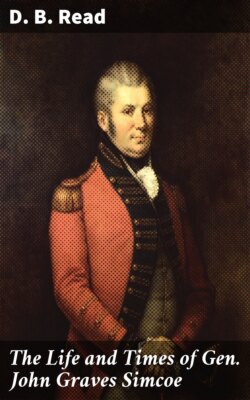Читать книгу The Life and Times of Gen. John Graves Simcoe - D. B. Read - Страница 21
На сайте Литреса книга снята с продажи.
ОглавлениеTHE QUEEN'S RANGERS HUZZARS,
Table of Contents
Commanded by
LIEUTENANT-COLONEL SIMCOE
"Any spirited young man will receive every encouragement, be immediately mounted on an elegant horse, and furnished with clothing, accoutrements, etc., to the amount of Forty Guineas, by applying to Cornet Spencer, at his quarters, No. 1033 Water Street, or his rendezvous, Hewitt's Tavern, near the Coffee House, and the depot at Brandywine, on Golden Hill.
"☛Whoever brings a Recruit shall instantly receive Two Guineas.
"VIVANT REX ET REGINA!"
Table of Contents
It will be observed that the recruiting officer did not fail to add the name of Queen as well as King to his advertisement, mindful, no doubt, that the regiment was The Queen's Rangers. Different from other regiments, the Queen's Rangers were almost exclusively at the command of their own commanding officer. It was understood that the regiment was always, and at all times, to be ready to strike a blow wherever they were most needed against the continental rebels, as those were called who, in arms, espoused the cause of the revolutionary Americans. To do this effectually, it was most essential that the corps should have full and complete liberty of action, and they had liberty to do or die in the service, without waiting for all the formalities of red tape and orders from the Commander-in-Chief. If the colonel of the regiment should at any time suggest an enterprise, however hazardous, but which, in his opinion, could be successfully undertaken, it was expected that his superior officer would sanction the duty without hesitation or reserve.
In the Pennsylvania Newspaper, of December 3rd, 1777, was printed the following notice:—"No regiment in the army has gained more honour in the campaign than Major Weys's (or the Queen's) Rangers; they have been engaged in every principal service, and behaved nobly; indeed, most of the officers have been wounded since we took the field in Pennsylvania. General Kniphausen, after the action of the 11th September, at Brandywine, despatched an aide-de-camp to General Howe with an account of it. What he said was short but to the purpose. 'Tell the General,' said he, 'I must be silent as to the behaviour of the Rangers, for I even want words to express my astonishment to give an idea of it.'"
On the 13th the following appeared in orders:—"The Commander-in-Chief desires to convey to the officers and men of the Queen's Rangers his approbation and acknowledgment for their spirited and gallant behaviour in the engagement of the 11th instant, and to assure them how well he is satisfied with their distinguished conduct on that day. His Excellency only regrets their having suffered so much in the gallant execution of their duty."
Throughout the whole war the Queen's Rangers were subject to most severe duties and were ever ready and anxious to perform any service which might be of benefit to the king's cause. They were quick in action, vigilant in performance of duty; of great endurance and undoubted courage. During the course of a week the Infantry would often march ninety miles, and the Hussars many more. They were penetrating and observant, skilled in ambuscade and stratagem, just the kind of corps suited to a country of wood and stream, of which they always endeavoured to make pitfalls for the enemy. There was a company of Highlanders added to the regiment, commanded by a most excellent officer, Captain McKay, who, like most Highlanders, did noble service for the King in the different campaigns which the Queen's Rangers went through. Before the war was over there was an accession to the regiment of an Irish company which added materially to the strength of the regiment. It was one of the privileges which the Queen's Rangers had, that when by the fortunes of war, death or disease, the regiment became reduced, the commanding officer, in order to fill up the ranks, was entitled to enlist Old Countrymen (as Europeans were termed in America) and deserters from the rebel army; so that were the officers, to whom the Commander-in-Chief delegated the inspection of the Provincial Corps able to execute their orders, the Queen's Rangers, however dangerously and incessantly employed, would never be in want of recruits; at the same time the major part of the regiment was made up of the native born Loyalists. The regiment, at its full strength, did not number more than five hundred and fifty Infantry, and yet was one of the most effective in the service. There were as many as twenty-seven other Provincial Corps of Loyalists who, no doubt, did excellent service, but as the Queen's Rangers was a flying column, specially detailed for outpost duty and roaming at large over the whole country, they were brought more into notice and were more prominent than other regiments which were raised to defend the loyal cause during the Revolution. It has been said of this corps "that no sentinel or guard of the Queen's Rangers was ever surprised"—the reason given is that sergeant's guards were in a manner abolished, the guard duty being principally performed by the commissioned officers of the corps. It would occupy too much time, to give a complete account of the life of Major Simcoe while attached to the Queen's Rangers, or a detailed description of all the engagements in which his regiment was engaged during the War of Independence, but it may be allowable and pardonable to dwell at some length upon the memoirs of an officer who, on more than one occasion, received the thanks of his superiors in the service, and of his King and country. It will be convenient to divide up his military service into campaigns, and as he joined the Queen's Rangers late in 1777, the campaign of 1777-1778 may well be described as a notable period of his military life.
